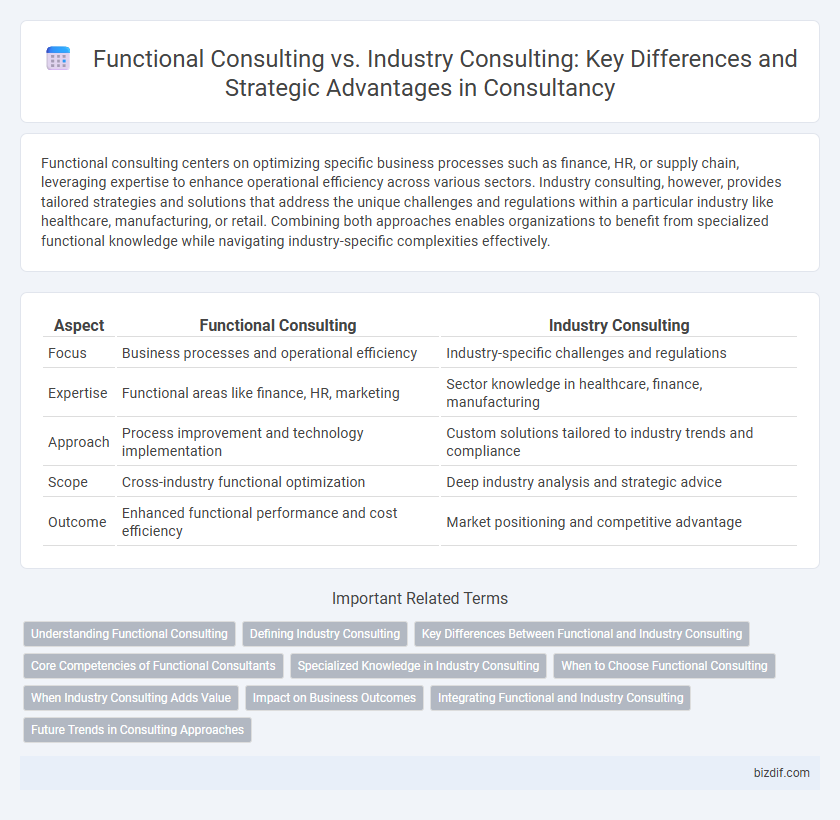Functional consulting centers on optimizing specific business processes such as finance, HR, or supply chain, leveraging expertise to enhance operational efficiency across various sectors. Industry consulting, however, provides tailored strategies and solutions that address the unique challenges and regulations within a particular industry like healthcare, manufacturing, or retail. Combining both approaches enables organizations to benefit from specialized functional knowledge while navigating industry-specific complexities effectively.
Table of Comparison
| Aspect | Functional Consulting | Industry Consulting |
|---|---|---|
| Focus | Business processes and operational efficiency | Industry-specific challenges and regulations |
| Expertise | Functional areas like finance, HR, marketing | Sector knowledge in healthcare, finance, manufacturing |
| Approach | Process improvement and technology implementation | Custom solutions tailored to industry trends and compliance |
| Scope | Cross-industry functional optimization | Deep industry analysis and strategic advice |
| Outcome | Enhanced functional performance and cost efficiency | Market positioning and competitive advantage |
Understanding Functional Consulting
Functional consulting specializes in optimizing specific business processes such as finance, supply chain, or human resources by leveraging industry best practices and technology solutions. It involves assessing organizational workflows, identifying inefficiencies, and implementing tailored strategies to improve operational performance within designated functions. Experts in functional consulting possess deep expertise in enterprise software systems like SAP, Oracle, or Microsoft Dynamics, enabling seamless integration between business functions and IT infrastructure.
Defining Industry Consulting
Industry consulting involves providing specialized expertise tailored to a specific sector, enabling businesses to address unique challenges and leverage market opportunities effectively. Consultants analyze industry trends, regulatory environments, and competitive landscapes to develop strategic solutions that drive growth and operational efficiency. This approach contrasts with functional consulting, which centers on optimizing specific business functions across industries rather than focusing on sector-specific issues.
Key Differences Between Functional and Industry Consulting
Functional consulting focuses on optimizing specific business processes such as finance, human resources, or supply chain management, emphasizing expertise in particular organizational functions. Industry consulting specializes in addressing challenges and opportunities unique to specific sectors like healthcare, manufacturing, or retail, leveraging deep knowledge of industry trends and regulations. Key differences between these consulting types include their scope of expertise, problem-solving approaches, and the customization of solutions based on either functional areas or industry-specific requirements.
Core Competencies of Functional Consultants
Functional consulting centers on deep expertise in specific business processes such as finance, human resources, or supply chain management, enabling consultants to optimize operational efficiency and system implementation. Core competencies of functional consultants include process analysis, requirements gathering, and the customization of enterprise resource planning (ERP) systems to align with organizational workflows. Unlike industry consulting, which focuses on sector-specific knowledge, functional consulting prioritizes proficiency in business functions to drive strategic improvements across diverse industries.
Specialized Knowledge in Industry Consulting
Industry consulting demands specialized knowledge of sector-specific regulations, market dynamics, and operational challenges that enable tailored solutions for clients. Functional consulting primarily focuses on optimizing core business functions such as finance, HR, and supply chain across various industries. Deep expertise in industry-specific processes and trends allows consultants to provide more precise strategic insights and competitive advantages.
When to Choose Functional Consulting
Functional consulting is ideal when organizations seek to optimize specific business processes such as finance, HR, or supply chain management, leveraging deep expertise in software applications and best practices. It is most effective during system implementations, process improvements, or technology upgrades that require specialized functional knowledge. Selecting functional consulting helps achieve targeted enhancements without the broader industry context influencing the solution design.
When Industry Consulting Adds Value
Industry consulting adds value by providing deep sector-specific expertise and tailored solutions that address unique market challenges, regulatory requirements, and competitive dynamics. Unlike functional consulting, which optimizes processes across various industries, industry consultants leverage specialized knowledge to enhance strategic decision-making and operational performance within particular verticals. This targeted approach drives more effective innovation, compliance, and growth strategies aligned with the specific needs of industries such as healthcare, finance, or manufacturing.
Impact on Business Outcomes
Functional consulting targets specific business processes such as finance, supply chain, or human resources to enhance operational efficiency and reduce costs. Industry consulting addresses sector-specific challenges and regulations, enabling tailored strategies that drive competitive advantage and market growth. Combining both approaches amplifies impact on business outcomes by aligning functional expertise with industry insights for comprehensive transformation.
Integrating Functional and Industry Consulting
Integrating functional consulting with industry consulting enhances tailored solutions by combining deep process expertise with sector-specific knowledge, driving more effective business transformation. Functional consultants bring proficiency in areas like finance, supply chain, and IT systems, while industry consultants contribute insights into regulatory environments, market trends, and competitive landscapes. This synergy enables clients to optimize operations, align strategies with market demands, and achieve sustainable growth through comprehensive, context-aware advisory services.
Future Trends in Consulting Approaches
Functional consulting emphasizes expertise in specific business processes such as finance, supply chain, or HR, leveraging technology to optimize operational efficiency. Industry consulting focuses on sector-specific challenges and regulations, tailoring strategies to evolving market dynamics within fields like healthcare, manufacturing, or retail. Future trends indicate a convergence of both approaches through advanced data analytics, AI-driven insights, and integrated solutions that deliver personalized value across functionalities and industries.
Functional consulting vs Industry consulting Infographic

 bizdif.com
bizdif.com